Best Essential Vitamins for Glowing Skin Tips
Table of Contents
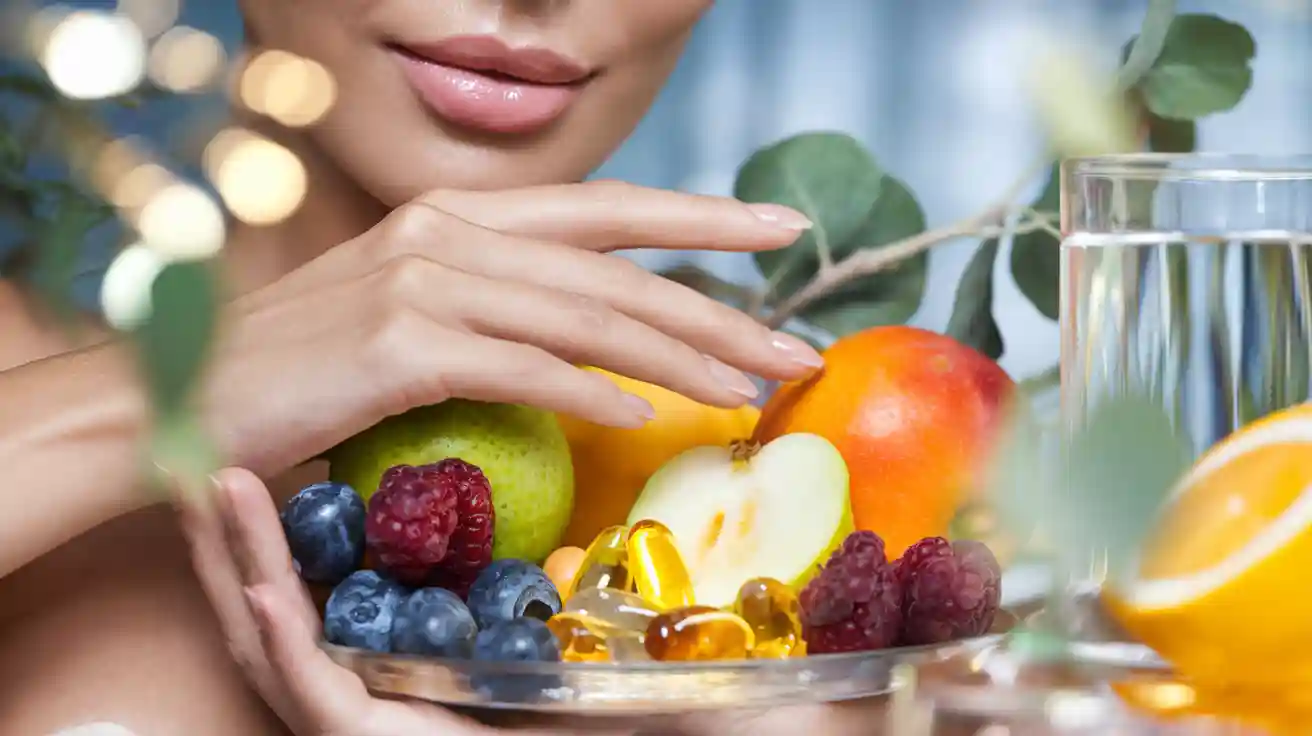
If you want radiant, glowing skin, you need essential vitamins and minerals like vitamin A, vitamin C, vitamin D, vitamin E, and zinc. These essential nutrients strengthen your skin barrier, boost collagen, and protect against damage. You can discover simple ways to support skin health and see real results in your daily routine.
Essential Vitamins for Glowing Skin
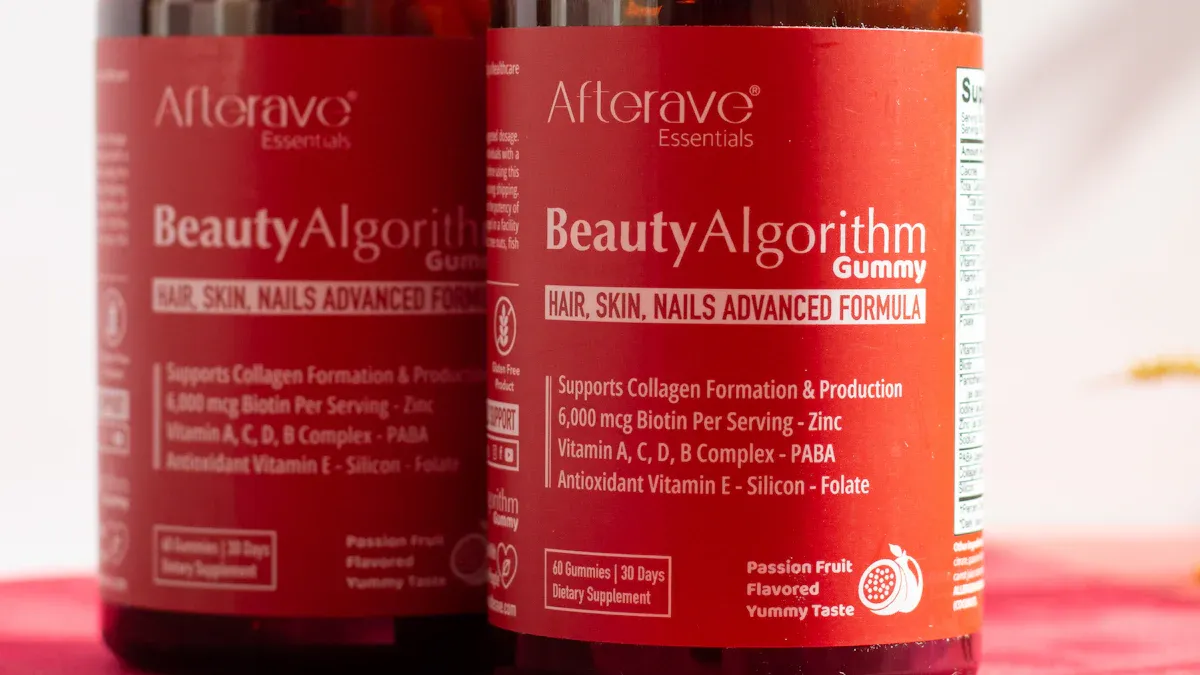
Overview of Best Vitamins for Skin
You might wonder which nutrients really make a difference for your skin. The best vitamins for skin work together to keep your face looking fresh and glowing. Here’s a quick look at some of the top choices:
| Vitamin | Benefits | Sources |
|---|---|---|
| Vitamin C | Required for collagen production, protects skin from damage | Citrus fruits, tomatoes, kiwifruit, broccoli, strawberries |
| Vitamin A | Acts as a natural sunblock, prevents skin damage | Sweet potatoes, carrots, spinach, kale |
These essential vitamins help your skin stay strong and bright. You can find them in many colorful fruits and veggies.
How Essential Vitamins Help Skin
Your skin needs more than just creams and lotions. Essential vitamins work from the inside out. They help your cells repair, protect, and renew themselves. When you get enough vitamin C, your body makes more collagen. This keeps your skin firm and smooth. Vitamin A helps your skin repair itself after sun or wind exposure. It also keeps your skin from getting dry or flaky.
Other best vitamins for skin, like vitamin E, protect your skin from free radicals and lock in moisture. Vitamin D helps your skin stay healthy and manage problems like dryness or redness. When you eat foods rich in these nutrients, you support glowing skin and boost your natural glow.
Tip: Try to eat a rainbow of fruits and vegetables every day. This gives your body the essential vitamins it needs for healthy skin.
Vitamin C
Skin Benefits
You want glowing skin that looks fresh and healthy. Vitamin C helps you get there. This vitamin acts as a powerful antioxidant. It fights off damage from the sun and pollution. When you use vitamin C, your skin can repair itself faster. It boosts collagen, which keeps your skin firm and smooth. Clinical studies show that vitamin C can reduce wrinkles and improve your skin’s texture. It also protects your skin from UV damage, especially when you use it with sunscreen. Scientists found that vitamin C makes the outer layer of your skin thicker and helps new skin cells grow. This means your skin can heal and look younger.
Vitamin C is also important for skin repair. It helps your body make collagen by supporting special enzymes. If you do not get enough vitamin C, your skin can look dull and weak. You might notice more signs of aging, like fine lines or rough patches.
Best Foods for Glowing Skin
You can find vitamin C in many tasty foods. Some of the best foods for glowing skin include:
- Strawberries (they have more vitamin C than oranges!)
- Kiwis
- Blueberries
- Citrus fruits like oranges and grapefruits
- Broccoli and bell peppers
These foods help your skin repair itself and stay glowing. Berries are packed with vitamin C and other nutrients that protect your skin from aging.
Supplement Tips
If you want to add more vitamin C to your routine, you can try supplements. Here is a quick guide for daily needs:
| Age | Recommended Dietary Allowance (RDA) |
|---|---|
| Kids (1–3 years) | 15 mg |
| Kids (4–8 years) | 25 mg |
| Adolescents (9–13 years) | 45 mg |
| Teens (14–18 years) | 65–75 mg |
| Adult women (aged 19 and older) | 75 mg |
| Adult men (aged 19 and older) | 90 mg |
| Pregnant women (aged 19 and older) | 85 mg |
| Breastfeeding women (aged 19 and older) | 120 mg |
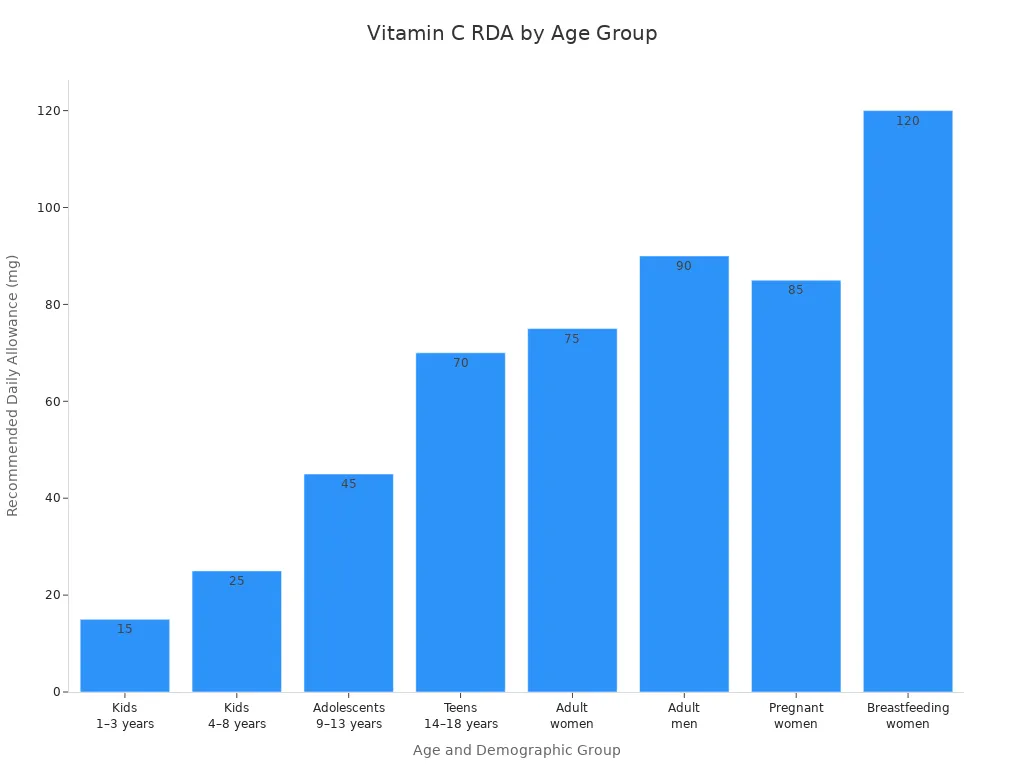
Most people get enough vitamin C from food, but you can use supplements if you need more. Do not take too much, because high doses can cause problems. If you have a health condition or take medicine, talk to your doctor before starting a new supplement.
Vitamin A
Skin Renewal
You want glowing skin that looks fresh every day. Vitamin A helps your skin renew itself. This vitamin works deep in your skin to boost natural collagen production and speed up skin regeneration. Retinoids, a form of vitamin A, help your skin shed old cells and make new ones. You see smoother texture and fewer fine lines. Scientists have found that vitamin A improves skin health by increasing collagen production and helping your skin fight signs of aging. It also helps treat acne and reduces dark spots. Take a look at how vitamin A supports glowing skin:
| Benefit | Description |
|---|---|
| Skin Cell Turnover | Retinoids promote skin cell turnover, leading to fresher skin and improved texture. |
| Collagen Production | Vitamin A stimulates collagen production, enhancing skin elasticity and reducing fine lines. |
| Treatment of Pigmentation | Retinoids help treat pigmentation disorders by regulating melanin production and promoting skin shedding. |
| Reduces Fine Lines | Vitamin A can minimize the appearance of fine lines and wrinkles, contributing to a more youthful appearance. |
| Acne Treatment | Topical retinol applications can effectively treat acne by promoting skin regeneration and reducing inflammation. |
Vitamin A also contains carotenoids, which give fruits and veggies their bright colors. Carotenoids act as antioxidants and protect your skin from damage. You get anti-aging properties and a glowing look when you include vitamin A in your routine.
Best Foods for Glowing Skin
You can find vitamin A in many foods. The best foods for glowing skin are packed with carotenoids and help your body with natural collagen production. Try adding these to your meals:
- Beef liver (super high in vitamin A)
- Sweet potato (full of carotenoids)
- Spinach (great for skin health)
- Carrots (rich in carotenoids)
- Cantaloupe (refreshing and supports glowing skin)
- Red bell pepper (colorful and loaded with carotenoids)
These foods help you get enough vitamin A for healthy skin and support skin regeneration. You see a glowing difference when you eat a variety of these foods.
Supplement Tips
You might want to boost your vitamin A with anti-aging supplements. Here are some tips to help you get the most out of vitamin A and carotenoids:
- Incorporate dietary sources first. Eat foods rich in vitamin A and carotenoids for natural collagen production and skin health.
- Use topical anti-aging supplements like retinoids at night. This helps your skin renew while you sleep.
- Be patient. Results from vitamin A and anti-aging supplements take weeks or months to show glowing skin.
- Consult your healthcare provider before starting new anti-aging supplements, especially if you are pregnant or nursing.
- Watch for side effects. Retinoids and anti-aging supplements can cause dryness or irritation. Use sunscreen to protect your skin.
Vitamin A, carotenoids, and anti-aging supplements work together to support skin regeneration, boost collagen production, and help you achieve glowing skin.
Vitamin E
Antioxidant Benefits
You want your skin to look fresh and glowing every day. Vitamin E gives you powerful protection against damage from the sun and pollution. This vitamin acts as one of the most important antioxidants for your skin. It helps shield your cells from oxidative stress. The compounds in Vitamin E, like tocopherol and tocotrienol, neutralize free radicals. You get support for healthy skin and a boost in your natural glow.
- Formulations that combine Vitamin E with other antioxidants show strong protective effects against photodamage. You see a real difference in skin health when you use these together.
- Vitamin E helps prevent collagen cross-linking and lipid peroxidation. This keeps your skin elastic and reduces signs of aging.
- Oral Vitamin E, especially with other antioxidants, can help reduce wrinkle formation and support collagen production.
Vitamin E levels in your skin drop as you age or spend time in the sun. Adding Vitamin E through food or supplements helps you maintain glowing skin and fight off environmental damage.
Best Foods for Glowing Skin
You can find Vitamin E in many delicious foods. If you want the best foods for glowing skin, try adding these to your snacks and meals:
- Almonds
- Walnuts
- Sunflower seeds
- Pumpkin seeds
- Avocados
Nuts and seeds are easy to carry and give you a perfect mix of nutrients for skin repair. Avocados also provide healthy fats and antioxidant-rich fruits that help your skin stay soft and glowing.
Supplement Tips
You might want to boost your Vitamin E intake with supplements. Here’s a quick guide to recommended amounts:
| Category | Recommended Dietary Allowance (RDA) in mg |
|---|---|
| Children 1-3 yrs | 6 mg/day |
| Children 4-8 yrs | 7 mg/day |
| Children 9-13 yrs | 11 mg/day |
| Teens & Adults | 15 mg/day |
| Pregnant | 15 mg/day |
| Breastfeeding | 19 mg/day |
| Category | Tolerable Upper Intake Levels (UL) in mg |
|---|---|
| 1-3 years | 200 mg/day |
| 4-8 years | 300 mg/day |
| 9-13 years | 600 mg/day |
| 14-18 years | 800 mg/day |
| 19 years & up | 1,000 mg/day |
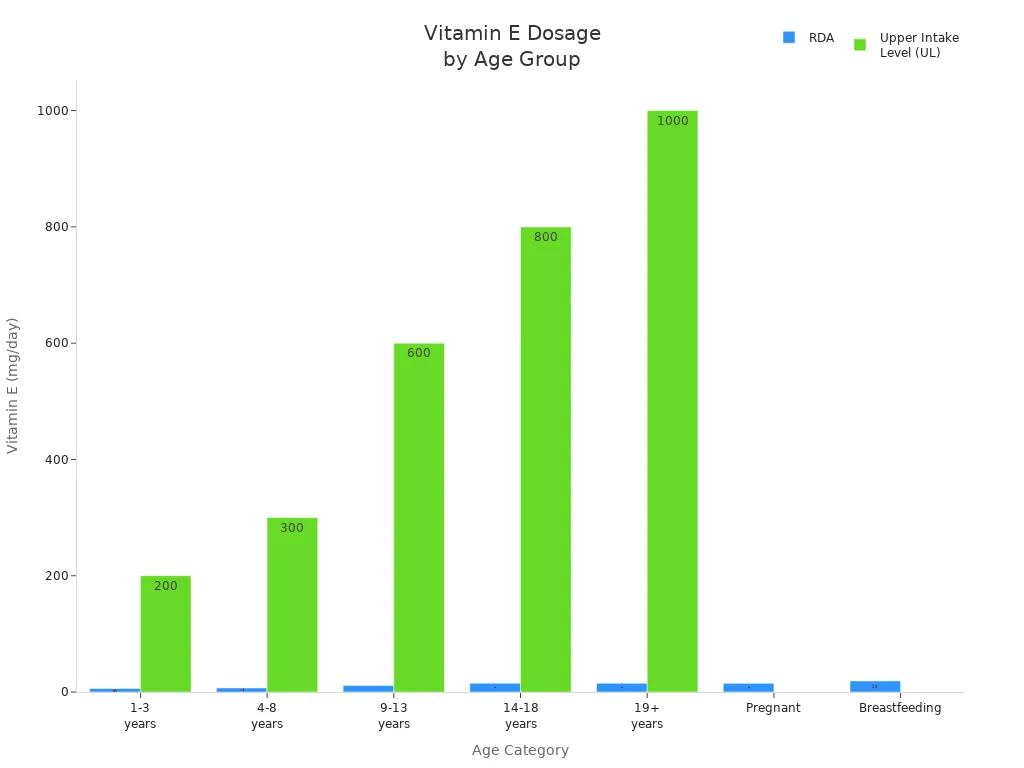
You can choose Vitamin E oil or cream for dry, itchy skin. Capsules and tablets work well if you need to increase your levels. Always check with your doctor before starting new supplements, especially if you have health concerns.
Vitamin D
Anti-Inflammatory Effects
Vitamin D does more than help your bones. It plays a big role in keeping your skin calm and glowing. When you get enough vitamin D, your skin can fight off redness and irritation. This vitamin helps your body make special proteins that protect against germs and help wounds heal faster. If you do not get enough, you might notice more breakouts or dry patches. Vitamin D also helps your immune system work better, so your skin stays clear and healthy.
Here’s how vitamin D supports your skin:
| Evidence | Description |
|---|---|
| Cathelicidin Regulation | Vitamin D helps your skin make cathelicidin, a protein that fights germs and helps healing. |
| Inflammation Modulation | It calms inflammation and helps new skin grow after damage. |
| Immune Response | Vitamin D helps your immune cells keep skin inflammation under control. |
| Cytokine Production | It boosts anti-inflammatory signals and lowers the ones that cause redness. |
| Skin Barrier Support | Vitamin D helps your skin build a strong barrier to block out germs and pollution. |
Tip: If you want glowing skin, make sure you get enough vitamin D to help your skin fight off sun damage and stay smooth.
Best Foods for Glowing Skin
You can get vitamin D from food, not just the sun. Some of the best foods for glowing skin are easy to add to your meals. Try these options:
| Food Source | Vitamin D Content (IUs) | Benefits for Skin Health |
|---|---|---|
| Fatty Fish (e.g., salmon) | 447 | Rich in omega-3s, supports heart and skin health |
| Fortified Foods (e.g., milk) | 137 | Helps your body absorb vitamin D with healthy fats |
| Egg Yolks | 41 | Easy to add to breakfast or salads |
| Beef Liver | 42 | Packed with nutrients for healthy skin |
| UV-Exposed Mushrooms | 450 | Plant-based, helps your skin make vitamin D |
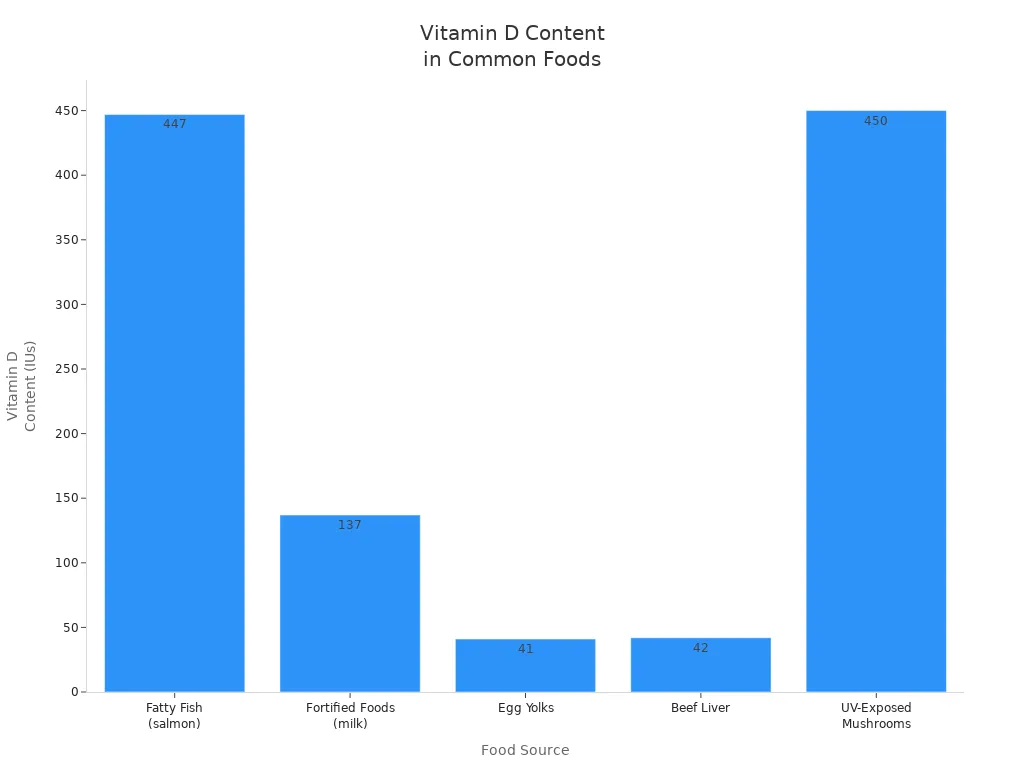
- Pair fortified foods with healthy fats for better absorption.
- If you do not like fish, try cod liver oil or UV-exposed mushrooms.
- Mix both plant and animal sources for the best results.
Supplement Tips
Sometimes, you need a little extra help to reach your vitamin D goals, especially if you spend a lot of time indoors or use sunscreen to protect against uv rays. Supplements can help you keep your skin glowing and healthy. Most people do well with up to 4,000 IU of vitamin D each day. Doctors say you can safely take up to 10,000 IU daily, but you should not go over that amount. Always talk to your doctor before starting a new supplement, especially if you have health problems.
You can also get vitamin D from safe sun exposure. Try to spend a few minutes outside each day, but avoid sunburn and too much uv. This helps your body make vitamin D naturally and keeps your skin looking its best. Remember, too much uv can cause sun damage, so balance is key.
Note: Regular skin checks and smart sun habits help you get the benefits of vitamin D without risking your skin’s health.
B Vitamins (Biotin)
Hydration and Health
You want your skin to feel soft and look fresh every day. B vitamins, especially biotin, play a big role in keeping your skin hydrated and healthy. Biotin helps your body make fatty acids that build a strong skin barrier. If you do not get enough biotin, your skin can become dry, flaky, or even irritated. Some people notice more breakouts or rough patches when their biotin levels drop. Other B vitamins, like B5, help your skin hold onto moisture and stay plump. You get soothing effects and better comfort when you include these vitamins in your routine.
- Biotin supports fatty acid production for a hydrated skin barrier.
- Lack of biotin may cause dry, flaky skin and irritation.
- B vitamins help your skin retain moisture and look glowing.
- Vitamin B5 keeps your skin plump and hydrated.
- B vitamins nourish dry, itchy skin and help with cell healing.
Tip: If you eat a balanced diet, you probably get enough biotin for healthy, glowing skin.
Best Foods for Glowing Skin
You can find biotin and other B vitamins in many tasty foods. If you want the best foods for glowing skin, try adding these options to your meals:
| Food Item | Biotin Content (mcg) | % Daily Value | Additional Benefits |
|---|---|---|---|
| Beef Liver | 31 | >100% | Protein, iron, vitamin A, other B vitamins |
| Eggs | 10 | 33% | Protein, healthy fats, vitamins A and D, selenium |
| Salmon | 5 | 17% | Omega-3 fatty acids, vitamin D, calcium, zinc |
| Pork Chops | 3.8 | 13% | Protein, selenium, phosphorus, zinc |
| Ground Beef | 3.8 | 13% | Protein, iron |
| Sunflower Seeds | 2.6 | 9% | Healthy fats, vitamin E |
| Sweet Potatoes | 2.4 | 8% | Vitamins A and C, fiber |
| Mushrooms | 2.5 | 8% | Antioxidants, vitamins D and B |
| Almonds | 1.5 | 5% | Healthy fats, vitamin E |
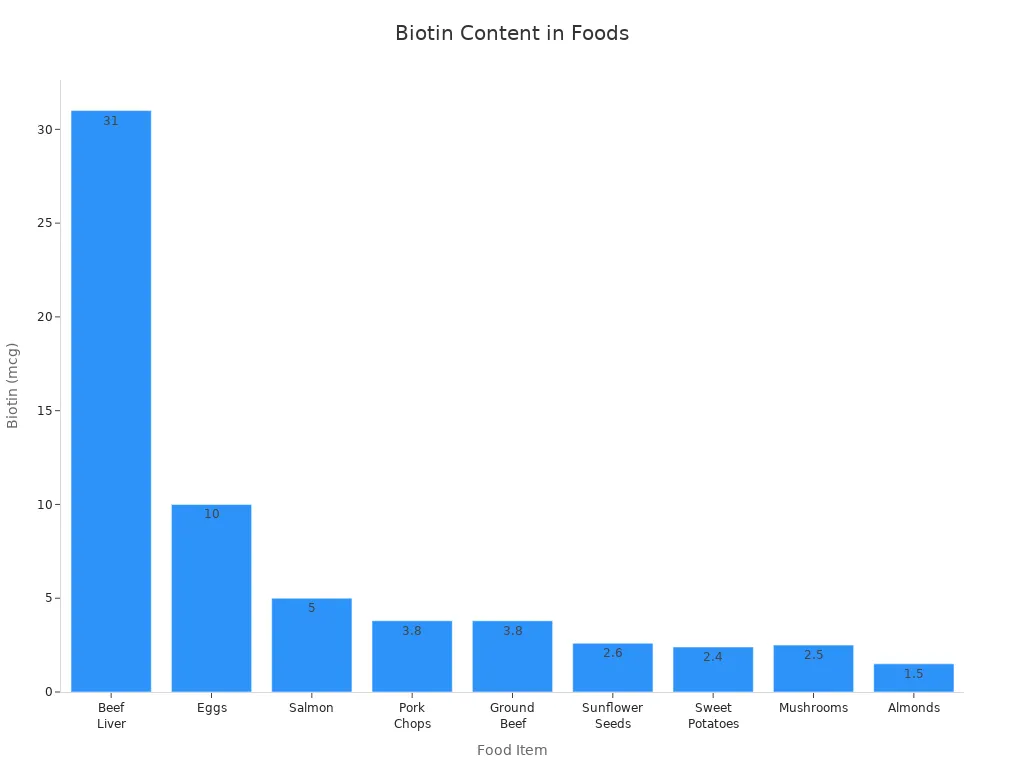
Supplement Tips
You might wonder if you need a supplement for B vitamins. Most people get enough from food, but sometimes a boost helps. Here’s a quick look at recommended amounts for adults:
| B Vitamin | Women | Men |
|---|---|---|
| B1 (thiamine) | 1.1 mg | 1.2 mg |
| B2 (riboflavin) | 1.1 mg | 1.3 mg |
| B3 (niacin) | 14 mg | 16 mg |
| B5 (pantothenic acid) | 5 mg | 5 mg |
| B6 (pyridoxine) | 1.3 mg | 1.3 mg |
| B7 (biotin) | 30 mcg | 30 mcg |
| B9 (folate) | 400 mcg | 400 mcg |
| B12 (cobalamin) | 2.4 mcg | 2.4 mcg |
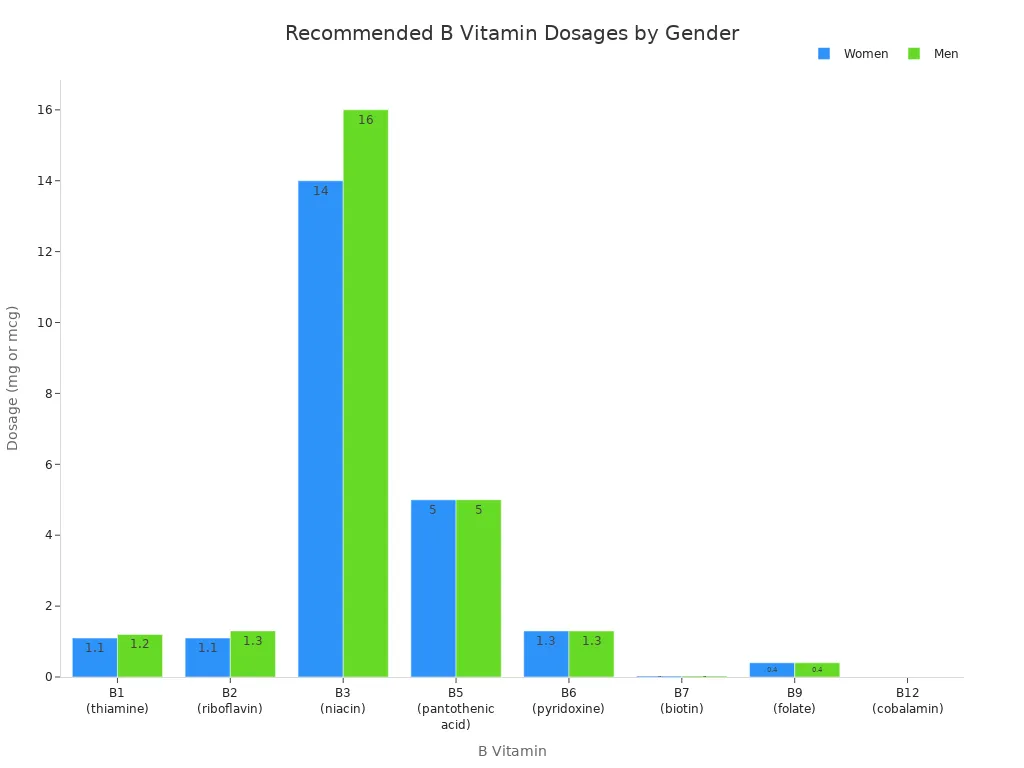
If you eat a variety of foods, you probably do not need extra biotin. Always check with your doctor before starting new supplements, especially if you have skin problems or health concerns.
Zinc, Selenium, Omega-3s
Clear and Protected Skin
You want clear, glowing skin that feels healthy every day. Zinc, selenium, and omega-3 fatty acids help your skin stay strong and protected. Zinc keeps your skin safe from UV damage and helps it heal after small cuts or acne. Selenium acts as one of the best antioxidants, fighting off free radicals and helping your skin stay firm. Omega-3s soothe redness and keep your skin barrier hydrated. These nutrients work together to improve skin texture and protect you from damage.
Here’s a quick look at how each nutrient helps your skin:
| Nutrient | Benefits for Skin Health |
|---|---|
| Zinc | Prevents UV-induced skin damage, supports skin repair, controls sebum, and helps prevent acne. |
| Selenium | Strong antioxidant, protects against DNA damage, boosts collagen, and reduces wrinkles. |
| Omega-3 Fatty Acids | Nourishes skin, soothes inflammation, improves texture, and supports skin barrier function. |
Tip: If you struggle with breakouts or dry patches, these nutrients can make a big difference.
Best Foods for Glowing Skin
You can find the best foods for glowing skin in your kitchen. Try adding these options to your meals:
- Oysters, red meat, poultry, and beans for zinc.
- Brazil nuts, eggs, and yellowfin tuna for selenium.
- Salmon, sardines, walnuts, and flaxseeds for omega-3s.
- Leafy greens like spinach and kale give you extra antioxidants and minerals.
Eating a mix of these foods helps your skin stay hydrated, clear, and glowing.
Supplement Tips
Sometimes, you need a little boost. You can take zinc supplements with food to avoid feeling sick. Omega-3s work best when you eat them with healthy fats. If you don’t eat fish, try algae oil or flaxseed capsules. Just two Brazil nuts a day give you enough selenium. Always start with small doses and talk to your doctor if you have skin problems or want to try new supplements.
Note: Supplements help, but whole foods give you more benefits for glowing skin.
Daily Tips for Glowing Skin
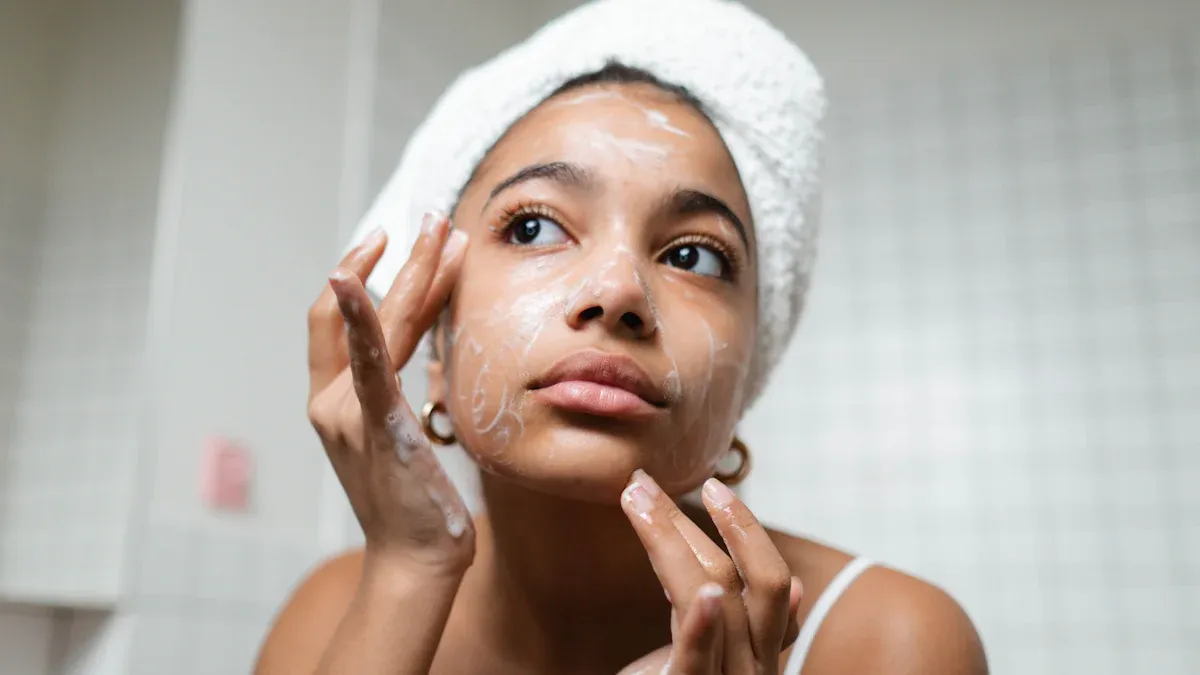
Routine Ideas
You can build a simple routine that helps your skin look its best every day. Start by drinking plenty of water. Hydration keeps your skin soft and plump. Add a daily multivitamin to your morning routine. This gives your body the nutrients it needs for healthy skin, like Vitamin C, Vitamin E, Vitamin D, and Biotin.
Try these easy steps:
- Eat fruits and vegetables at every meal. Colorful foods give you antioxidants and vitamins.
- Snack on almonds, sunflower seeds, or avocados for Vitamin E.
- Choose fatty fish, walnuts, or flaxseeds for omega-3 fatty acids.
- Exfoliate your skin once or twice a week. This removes dead skin and helps your face look glowing.
- Use sunscreen with at least SPF 30 before you go outside. Sun protection keeps your skin safe from damage.
- Get enough sleep each night. Your skin repairs itself while you rest.
Tip: A balanced diet and good sleep help you wake up with glowing skin.
Tailoring Choices
Everyone’s skin is different. You can adjust your routine to fit your needs. If you have dry skin, focus on foods with healthy fats and drink extra water. Oily skin may benefit from more leafy greens and regular exfoliation. Sensitive skin needs gentle products and extra sun protection.
You can also talk to your doctor about supplements if you have special concerns. Listen to your skin and make small changes until you find what works best. With the right habits, you support skin health and enjoy a natural, glowing look.
You can achieve glowing skin by adding essential vitamins to your daily meals. These nutrients help your skin look healthy and glowing. Try new foods or supplements with essential vitamins. Stay consistent and you will see results. Your skin will thank you for the extra care!
FAQ
What vitamin helps your skin glow the most?
Vitamin C gives your skin a bright, healthy look. You can eat oranges, strawberries, or broccoli for a natural boost. 🍊
Can you get glowing skin from supplements alone?
Supplements help, but you need healthy foods, water, and sleep for the best results. Your skin loves a balanced routine.
How fast will you see results after adding vitamins?
You might notice changes in two to four weeks. Stay consistent with your routine. Your skin needs time to renew.

Poseidon
Master of Nutritional Epidemiology, University of Copenhagen, Herbal Functional Nutrition Researcher
Focus: The scientific application of natural active ingredients such as Tongo Ali, Horny Goat Weed, and Maca to sexual health and metabolic regulation.
Core Focus:
Men: Use a combination of Tongo Ali (an energizing factor) + Maca (an energy reserve) to improve low energy and fluctuating libido.
Women: Use a combination of Horny Goat Weed (a gentle regulator) + Maca (a nutritional synergist) to alleviate low libido and hormonal imbalances.
Stressed/Middle-Aged Adults: This triple-ingredient synergy supports metabolism, physical strength, and intimacy.
Product Concept:
Based on traditional applications and modern research (e.g., Tongo Ali promotes testosterone-enhancing enzyme activity, and icariin provides gentle regulation), we preserve core active ingredients and eschew conceptual packaging—using natural ingredients to address specific needs.
Simply put: I'm a nutritionist who understands "herbal actives." I use scientifically proven ingredients like Tongo Ali, Epimedium, and Maca to help you make "sexual health" and "nutritional support" a daily routine.
